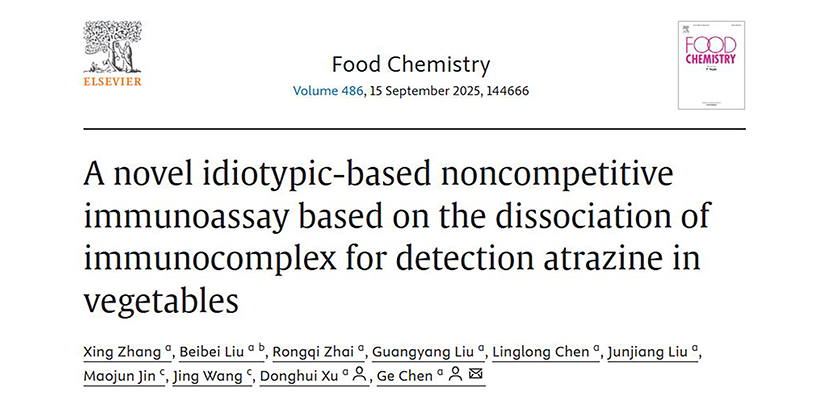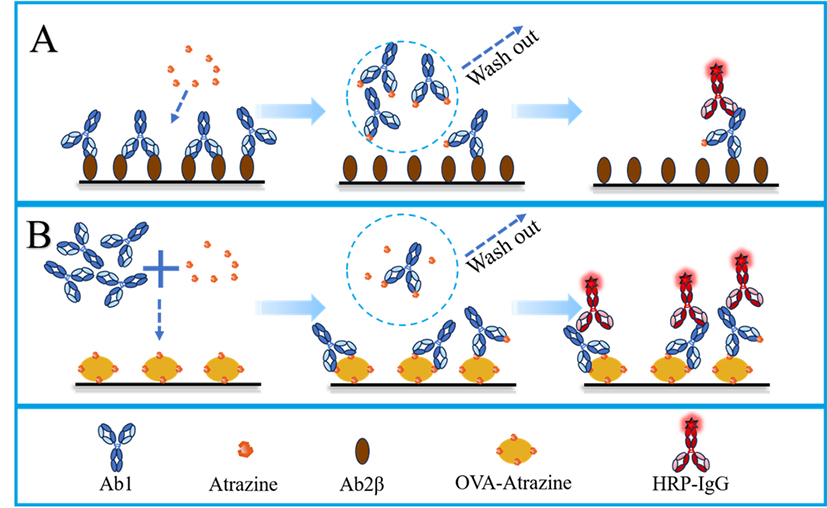Recently, the Quality and Safety Research group of the Institute of Vegetables and Flowers, Chinese Academy of Agricultural Sciences, developed a novel non-competitive immunoassay rapid detection technology. This technology enables the fast and sensitive detection of atrazine residues, providing a new approach for monitoring pesticide small molecule chemical contaminants in agricultural products. The study was published in Food Chemistry under the title "A novel idiotypic-based noncompetitive immunoassay based on the dissociation of immunocomplex for detection of atrazine in vegetables."

Atrazine is a selective, systemic herbicide of the triazine class, commonly used for weed control in crops such as vegetables and corn. However, its residue in vegetable crops can pose a threat to the environment and human health. Establishing a rapid, simple, accurate, and sensitive immunoassay method is helpful for quickly assessing pesticide residue levels in a large volume of fresh vegetables in China. Due to the presence of only one antigen recognition site for the small molecule contaminant of atrazine, competitive immunoassay technologies are typically used for rapid monitoring and early warning of pesticide residues in vegetables. However, competitive immunoassay technologies face challenges such as a narrow linear range when detecting atrazine residues in vegetables.

To address the above issues, this study utilizes atrazine as the "key" to specifically unlock the "lock" of the anti-idiotypic antibody capture antibody immunocomplex. A novel non-competitive immunoassay technology based on idiotypic antibodies was developed and successfully applied to detect atrazine pesticide residues in 10 vegetable samples, including purple cabbage, carrots, Chinese cabbage, and cucumbers. Compared to traditional competitive immunoassay techniques, the linear range of the novel technology was increased by two orders of magnitude, expanding the application range of small molecule immunoassays such as pesticides. This immunoassay was developed to satisfy the urgent need for timely vegetable quality and safety monitoring in China and improve the efficiency of pesticide residue detection in vegetables. It provides a theoretical foundation for quickly assessment pesticide residue levels in a large volume of fresh vegetables, ensuring the safe and secure supply of vegetables to the public.

The Institute of Vegetables and Flowers, Chinese Academy of Agricultural Sciences, is the lead institution for this work. Zhang Xing (a master's student, Institute of Vegetables and Flowers, Chinese Academy of Agricultural Sciences) is the first author. Assistant Researcher Chen Ge and Researcher Xu Donghui are the co-corresponding authors. The study was conducted at the National Key Laboratory of Vegetable Biological Breeding, supported by the Ministry of Agriculture and Rural Affairs' Key Laboratory of Vegetable Quality and Safety Control, and funded by the National Natural Science Foundation, National Key R&D Program, and the Agricultural Science and Technology Innovation Project of the Chinese Academy of Agricultural Sciences.
Web site of the paper: https://doi.org/10.1016/j.foodchem.2025.144666